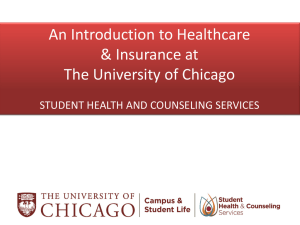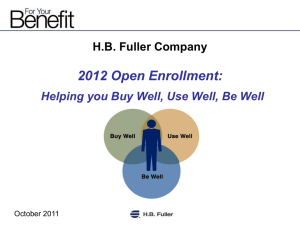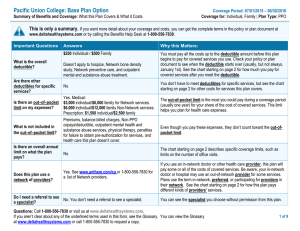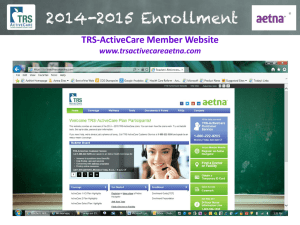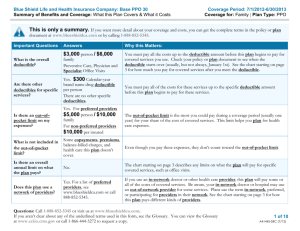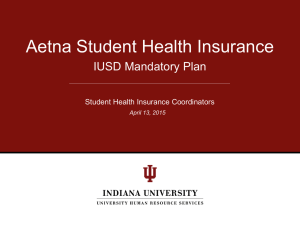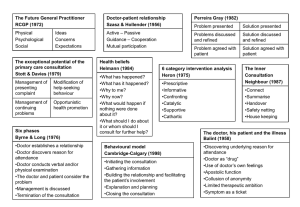Why do I need health insurance?
advertisement
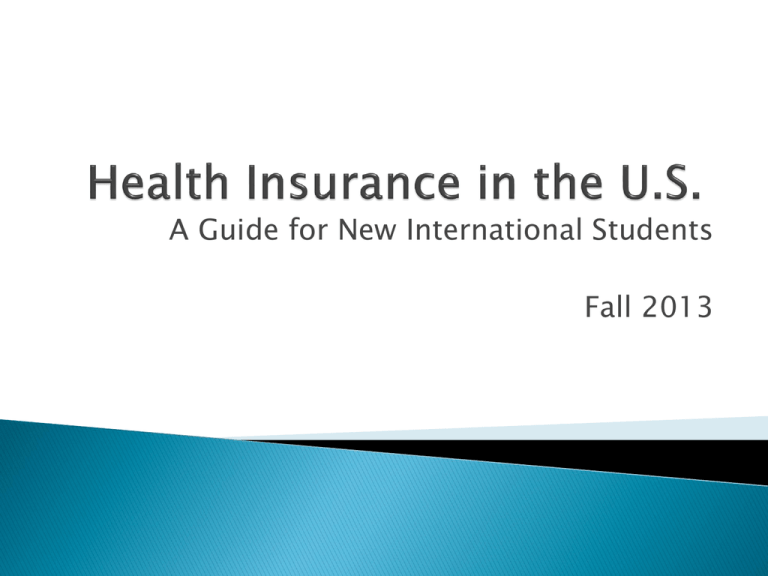
A Guide for New International Students Fall 2013 The U.S. has no national health care system. Each person is responsible for the cost of their own health care. Medical care in the U.S. is very expensive. The costs of a serious accident or illness can end a student’s academic career. Emory University requires all students to carry health insurance. For J-1 students, health insurance is also required by law. Individuals pay a “premium” to enroll in a health insurance plan. That payment is combined with the premiums of others in the plan to form a pool of money. The money is then used to pay the medical bills of those in the plan who need medical care. Your policy will state what the insurance company will pay for, and how much of the bill you will have to pay. Co-Insurance: The percentage of covered expenses you share with the carrier. (i.e., for an 80/20 plan, your co-insurance is 20%.) If applicable, co-insurance applies after you pay the deductible Co-Payment: The amount you must pay toward the cost of a particular benefit. For example, a plan might require a $10 co-pay for each doctor's office visit. Deductible: The dollar amount you must pay for covered expenses during a calendar year before the plan begins paying co-insurance benefits. Exclusions: Expenses which are not covered under an insurance plan. Lifetime maximum: the maximum amount a health plan will pay in benefits to an insured individual. Out-of-pocket maximum: Guidelines set to limit the amount you have to pay out of your own pocket for particular healthcare services during a particular time period. Pre-certification: Pre-admission review and approval of appropriateness and medical necessity of hospitalization or other medical treatment. Pre-existing condition: A condition which existed or for which you received medical care during a certain number of months or years before the policy was purchased. Will often not be covered by the insurance company, or will only be covered after a waiting period. Premium: The amount you pay to buy the policy Referral: Within many managed care plans, transfer to a specialty physician or specialty care by a primary care physician We’ll use the Aetna Student Health plan as an example. You have gone to a friend’s house in another state over Spring Break. One night, you accidentally cut your hand. The cut looks very deep, and it won’t stop bleeding. Your friend takes you to the emergency room. Since you’re not near Emory, the hospital is not in the core network. Instead it is an innetwork hospital. At the emergency room, you pay your $50 co-payment. You get stitches in your hand and are sent home. When you receive your hospital bill, the amount is $1,500. Because you have insurance, most of it will be paid by the insurance company. How much? Let’s find out… Since this is the first time you have used your insurance plan, you need to pay your deductible before the insurance company begins to pay their portion. Since you went to an innetwork hospital, your deductible is $250. This leaves $1,250 still to be paid. Bill so far: Emergency Room co-pay: $50 Deductible: $250 At an in-network hospital, Aetna will pay 80% of the bill after you have paid the deductible. You are responsible for the other 20%. This is your co-insurance. For your emergency room visit, Aetna will pay $1,000. You will be responsible for the additional $250. Your bill so far: Emergency Room co-pay: $50 Deductible: $250 Co-insurance: $250 Aetna’s bill so far: Co-insurance: $1,000 Your doctor also gave you a prescription for antibiotics that you need to fill at a pharmacy. The cost of the antibiotics is $60. For a generic prescription, you pay a $15 co-payment. The insurance company pays for the rest of the medication, up to at an unlimited amount per year. For this prescription, they will pay the remaining $45. Your bill so far: Emergency Room co-pay: $50 Deductible: $250 Co-insurance: $250 Prescription: $15 Aetna’s bill so far: Co-insurance: $1,000 Prescription: $45 A week later, you go to the doctor to have your stitches removed. At the doctor, you pay your $25 co-payment. Your bill for the doctor’s visit is $200. Since your co-insurance is 20%, you pay $40. Aetna pays the remaining $160. Your bill so far: Emergency Room co-pay: $50 Deductible: $250 Co-insurance: $250 Prescription: $15 Doctor’s visit co-pay: $25 Doctor’s visit co-insurance: $40 Aetna’s bill so far: Co-insurance: $1,000 Prescription: $45 Doctor’s visit co-insurance: $160 Your costs: Emergency Room co-pay: $50 Deductible: $250 Co-insurance: $250 Prescription: $15 Doctor’s visit co-pay: $25 Doctor’s visit co-insurance: $40 Aetna’s costs: Co-insurance: $1,000 Prescription: $45 Doctor’s visit co-insurance: $160 Total: $630 Total: $1,205 Without health insurance, you would have had to pay the full $1,835. All Emory students must have health insurance that is valid in Atlanta All students who wish to use their own insurance plan must complete the mandatory insurance waiver process on-line via OPUS each year while enrolled at Emory You must certify that your insurance plan meets certain criteria in order to be given a waiver. DEADLINE AUG 27th EUSHS Insurance Office: 404-727-7560 or email us at: mandatoryinsurancelistserv.cc.emory.edu.. All students will receive a mailing in May or June with information and enrollment materials for the Emory/Aetna Insurance Plan Three-tiers of coverage, including an Emory Healthcare Core Network, covered at 90% (after an annual deductible of $150, copayment of $25 for specialist care and $50 for Emergency Room); co-payments are waived at Emory Student Health and Counseling Services), Preferred Care at Aetna PPO providers (80% coverage after co-payment and a $250 annual deductible) and Out-of-Network care (60% coverage after co-payment and a $400 annual deductible). Emory’s 2014-15 Aetna plan has no pre-existing illness restrictions, gives 100% coverage at EUSHS, covers immunizations, travel clinic, mental health. Information about the plan can be obtained by calling the EUSHS Insurance Office at 404-727-7560 or www.studenthealth.emory.edu or www.aetnastudenthealth.com You must have a referral from an EUSHS provider prior to receiving care from a specialist. For ongoing care, the referral must be renewed at the beginning of the new policy year (generally, a phone call to your EUSHS provider will do) Annual premium of $2,850 Medical plan maximum increasing from $500,000 to unlimited (at SHS and outside pharmacies) Pharmacy maximum increasing from $500,000 to unlimited (at SHS and outside pharmacies) Coverage for Pediatric Dental (up to age 19) Coverage fro Pediatric Glasses (lenses and frames) (up to age 19) Out-of-Pocket Maximum (to include all medical and prescription copays, deductibles and coinsurance) Coverage of Allergy Treatment (including serum and allergy shots outside EUSHS) Treatment and Extractions of Wisdom Teeth Coverage of Infertility Treatment Mandated State of Georgia insurance changes Dependent coverage for spouses , domestic partners and children is available for an additional cost: spouse ($6,656); Child/ren ($2,997). Enroll online at www.aetnastudenthealth.com Routine Dental coverage is not available but the Vital Savings discount program can be purchased for $25 per policy year. Routine Vision is not covered. The EyeMed discount program is available. International Students: 8/1/14 – 7/31/15 Your ID card will be sent to your local Atlanta address. If not received, contact Aetna Student Health at 1-877-261-8403 to update your address and request another card. A temporary ID card can be printed by accessing Aetna's website at https://www.aetnastudenthealth.com/student s/studentconnection.aspx?GroupID=812808 , click on the “Print Your ID Card” tab. To print a temporary ID card, you will need your Emory student ID# (preceded by 444 + student ID) and date of birth. Student Health at the 1525 Clifton Road Building Counseling Center at 1462 Clifton Rd. Suite 235 Via cyberspace at: studenthealth.emory. edu
